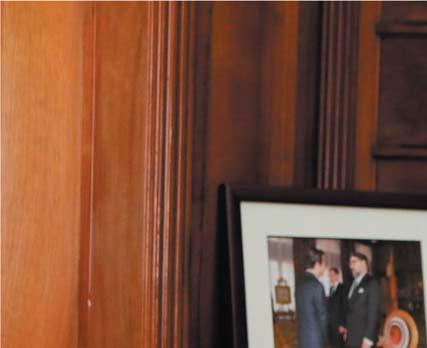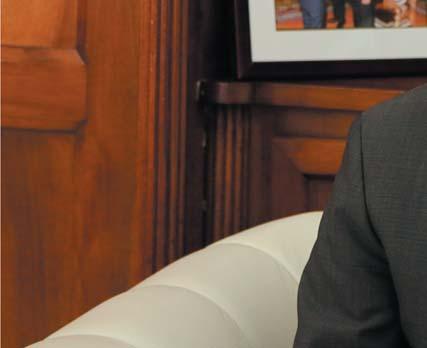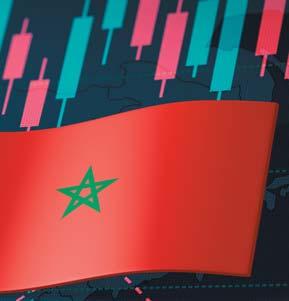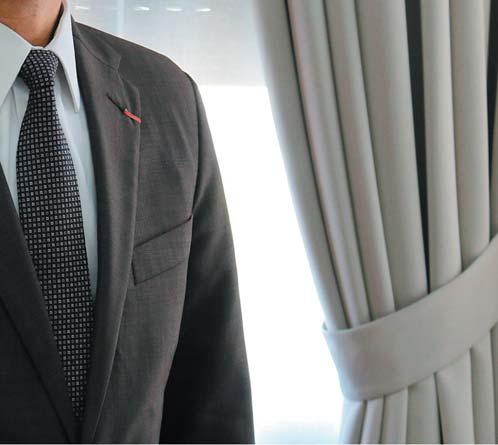
14 minute read
European Business Talks Exclusively To Mr Mohammed Benchaaboun
European Business Talks Exclusively to
Mr Mohammed BENCHAABOUN
Advertisement
Minister of Economy and Finance about the rising global economic powerhouse that Morocco is becoming and their plans for the future.

Africa is home to seven of the world’s ten fastest growing economies and by 2050 the con nent’s popula on is expected to overtake India’s and Chinas, doubling to 2 billion people.
What can Morocco, the gateway to Africa, off er to enrich the corporate landscape?
Morocco enjoys an outstanding geographical posi on at the crossroads of the Arab world, the African con nent and Europe. This posi on naturally off ers our country the opportunity to serve as a gateway for European companies and investors seeking business opportuni es in Africa. In this regard, Moroccan authori es have deployed tremendous efforts over the last few years to establish Morocco’s posi on as a regional economic and fi nancial hub, through several sectoral and structural reforms aimed at enhancing the business environment and strengthening industrial and export infrastructure, with a major focus on diversifying trade and investment partners, including in Africa. Morocco has also developed a large network of bilateral agreements, comprising of 26 Bilateral Investment Trea es (BIT) and 20 double taxa on agreements with its African partners. These agreements aim to create a stable and conducive legal environment for the development of bilateral investments, in line with our strategy to consolidate Morocco’s posi on as the second largest African investor on the con nent and the largest investor in western Africa. Likewise, as an ac ve member of the African Union, Morocco is part of the new African Con nental Free Trade Area (AfCFTA), which entered into force in May 2019. This free trade area, the world’s largest in terms of number of participating countries, will grant Morocco-based companies access to a market of 1.2 billion people and a gross domestic product (GDP) of $2.5 trillion, across all member States of the African Union. In this regard, Moroccan companies are well poised to seize the opportunity of increased intra-african trade


under the AfCFTA agreement, drawing on the support and wide-ranging regional experience of Moroccan banks operating in Africa and the resolute commitment of Moroccan authori es to pave the way for stronger economic and trade rela ons with our African partners. Last but not least, it is worth men oning that our Casablanca Finance City, Africa’s leading fi nancial center, is home to the Africa 50 fund, which is an infrastructure investment pla orm that contributes to Africa's growth by developing and inves ng in profitable projects. It serves as a catalyst for public capital while mobilizing private sector fi nancing to meet increasing fi nancing needs for infrastructure projects in our con nent.
Morocco has chosen manufacturing as a strategic sector for its socio-economic development.
Can you elaborate on these opportuni es and tell European
Business Magazine readers why now is a good me to look to
Morocco for business partnerships and development? Addi onally, how can the country’s impressive capacity for innova on assist in the rapidly changing global market?
Morocco has been engaged for several years in an accelerated process of industrializa on, refl ec ng its fi rm desire to bring out new export sectors with higher technological content, to strengthen the country's attractiveness to foreign investments and to improve its posi oning in global value chains. By way of illustra on, the automo ve sector emerged as the leading exporting sector since 2014, with a share in total exports that doubled in less than ten years to reach 24%. Automobile produc on thus reached 402,000 units in 2018 against barely 10,000 vehicles in 2004, with a level of local integra on of over 50% and a market share of nearly 40% on the African con nent. The aeronau cs industry is also booming, with exports that have more than doubled since 2007 and a local integra on rate reaching 38% against 17% in 2014, exceeding the ini al target of 32% set for the 2020 horizon. The implementation of the 20142020 Industrial Accelera on Plan was based on concrete measures, in par cular the establishment of ecosystems for a more integrated industry, which enabled the implementa on of several investment projects with posi ve results in terms of added value crea on and employment posi ons. With the outbreak of the COVID19 pandemic, the Moroccan industry has shown great capacity to cope with this new context and meet the pressing needs of the domes c market. Indeed, our manufacturers have mobilized quickly to meet Morocco's supply needs with sanitary and hygiene products, pharmaceuticals and foodstuffs. Several textile factories have also converted into manufacturing protective masks and textiles for medical use, and major automo ve and aeronau cal players have embarked on the manufacturing of respirators. For the future, we have already defined a new 2021-2023 industrial recovery strategy, which aims to confi rm the industrial posi on of the Kingdom and to conquer new markets using public procurement as a catalyst. To this end, the new Plan aims to replace 34 billion DH of imports by local produc on, by targeting eight main sectors namely, textiles, transport, mechanical and metallurgical industries, plas cs, electrical and electronics, agri-food, Para chemistry and leather. To do this, a fi rst bank of 100 projects has already been set up in the various sectors men oned above, with support for Moroccan entrepreneurs in setting up their projects and securing their fi nancing. A second axis of this strategy relates to improving the competitiveness of the Kingdom with the objective of becoming the most competitive global base for Europe. Finally, a third axis concerns the posi oning of the Kingdom as a carbon-free and circular industrial base, by mobilizing part of the Kingdom's renewable energies to meet energy needs of the industrial fabric at the best possible cost.
Morocco has made substan al progress in the digital sector and digital technologies. With new technologies and working methods emerging as a result of the COVID-19 pandemic, what opportuni es will evolve in
Morocco from this increased digi sa on?
The era of digi za on and the digital transition of economies is now becoming urgent. With the COVID19 crisis, this transi on was accompanied, at the na onal level, by an acceleration in the use of digital
technologies due, in particular, to the organiza onal transforma on of work with the mass deployment of teleworking and distance educa on. It has also forced the use of e-commerce which has emerged, in this context, as a vector for the growth of domes c and export trade transac ons. Moreover, under the infl uence of the pandemic, the dematerializa on of certain services has been widely deployed. The health crisis has indeed given a boost to digitaliza on eff orts, which will undoubtedly play a major role in post-COVID-19 Morocco. It will undoubtedly offer opportunities to s mulate the growth and compe veness of our economy while promoting its inclusion. This situa on has led Moroccan companies to completely rethink their organiza onal models, as 41% of them consider that the lockdown pushed them to adopt new technological and digital approaches to alleviate the impact of the crisis. The question of using digital and dematerialized services is an acute one. In this context, the digital transforma on is considered by the Government as a strategic lever for the improvement of public services. To this end, several public administrations have adopted digital tools to promote teleworking and have chosen to limit the physical exchange of documents and administrative letters. In order to support this dynamic, the Digital Development Agency launched, in June 2020, several digital ini a ves to promote and facilitate remote working within Moroccan administra ons. Despite its negative impact on the trade sector, the COVID-19 crisis has further revealed the poten al of e-commerce. Companies that have relied on this niche have been more resilient and able to cushion the downside shocks of the pandemic on their businesses. Moreover, the performance of contactless mobile payments in Morocco increased by 710% between the end of March and the end of May 2020, compared to the same period of the previous year, which indicates the poten al to be seized through an accelera on of the digitaliza on of domes c trade. In addi on, public companies operating in the fi eld of transport and logis cs have operated a shi in their processes in order to make the services provided to professionals and ci zens more efficient, by proceeding with the dematerializa on of documents and procedures.



Morocco’s virus management has been no ced and praised in
Europe. Very early on the kingdom took the decision to close its borders and set up guidelines for supply, mobilising the industrial sector to fi ght the disease and revealing innova ve and engineering capabili es. Can you tell our readers a bit more about your methods and procedures, and how is Morocco placed for an economic recovery post Covid-19?
Morocco was among the fi rst countries to succeed in demonstrating exemplary proac vity in an cipa ng the risks and consequences of the Covid-19 pandemic. In response to this crisis, Morocco has placed the life of its ci zens at the forefront of priori es, by taking bold measures to stem the spread of the pandemic, and by deploying unprecedented support mechanisms for the benefi t of social classes whose vulnerability has been exacerbated by the crisis. In this context, and in accordance with His Majesty’s Instruc ons, a proac ve and mul dimensional response strategy has been put in place in order to limit the health, economic and social repercussions of this pandemic. Thus, a special solidarity fund was created, dedicated to the management of the COVID-19 pandemic. This fund has made it possible to raise more than $ 3 billion to date. Likewise, targeted support measures have been taken in favor of households and businesses to mi gate the impact of the lockdown and preserve the productive poten al of the economy. With the objec ve of suppor ng the gradual restart of the ac vity and creating the conditions for a vigorous economic recovery at the end of the COVID-19 crisis, we are working on the accelera on of the implementa on of our na onal economy recovery plan, through the mobiliza on of all available means in terms of fi nancing, incen ve mechanisms and solidarity measures.





This plan, which will cover transversal measures as well as sector-specifi c measures, will be endowed with nearly 120 billion DH to support the economic recovery, including 45 billion DH allocated to the financing of investment projects by appealing to public private partnerships (PPP) and strengthening the capital of companies, especially small businesses, for the purposes of their development within the framework of the “Mohammed VI Investment Fund”. The remaining 75 billion DH will be granted in the form of State-guaranteed loans for the benefit of all business segments. The Government is also commi ed to deploying na onal preference in the fi eld of public procurement to support the development of very small businesses, to accelerate the reforms required to improve the business environment, to upgrade the training and human capital development system to improve the training-job match and to accelerate the adop on of the amendment to the Law on payment terms and related decrees. For its part, the private sector has undertaken to preserve jobs by maintaining a level greater than or equal to 80% of stable jobs, to allow undeclared workers to benefi t from the social security system, to fight against informal prac ces, to reserve at least 50% of State-guaranteed loans to the reduc on of business-to-business debt, to encourage fi nished or intermediate products with strong local content, to understand the opportuni es off ered by digitaliza on, to further develop con nuing training and contribute to improving the training-job match, while ensuring compliance with the code of good corporate governance prac ces and health rules. Morocco has excep onally good es with European countries, but the partnership between the EU and Morocco could become even more robust through industrial coopera on. Can you tell European Business Magazine readers more about how this can happen? The rela onship between the Kingdom of Morocco and the European Union showed a positive development as it is clearly demonstrated by the adop on of the Joint Poli cal Declara on, on June 27, 2019 for shared prosperity. This development comes at a time when Morocco is trying to set up a new development model which opens up new opportuni es including in terms of industrial coopera on. In addi on, the COVID-19 pandemic has highlighted the need to adopt new paradigms to ensure the security, con nuity and fl uidity of value chains. This pandemic has also shown the Kingdom's ability to respond eff ectively to its domestic demand, and even supply other countries, for important products such as paramedical products. In this context, as a reliable and secure country, at the gateway to Europe, and a reservoir of compe veness, Morocco aims to play a leading role in the implementation of regional value chains at the Euro-Mediterranean level. Indeed, enhancing industrial coopera on between the EU and Morocco, in terms of integra on of Morocco into the perimeter of nearshoring of European industries, will allow a better diversifi ca on and security of supply to European markets. That’s why, we encourage European industrialists to pursue and accelerate their development in Morocco within the framework of new regional value chains, capitalizing on geographical proximity, reduced logis cs costs and the Kingdom's comparative advantages as well as the reduc on of the environmental footprint of the supply chain.


Morocco has forged an interna onal reputa on as a reliable and credible partner. What can we expect to see from Morocco in 2021 and beyond?
Far-reaching reforms have been implemented at the institutional, structural and sectoral level and have made it possible to diversify our economy, ensure sustained growth and consolidate macroeconomic stability. This progress has resulted in the maintenance of the confi dence our country enjoys with interna onal institutions and foreign investors, despite an uncertain interna onal and regional environment. These reforms have enabled our country to achieve

remarkable performances in terms of improving the business climate, as evidenced by the "Doing Business" ranking where Morocco has gained 76 places since 2009. Despite these positive results, our economy continues to face major challenges, including accelerating structural transforma on, strengthening poten al and inclusive growth, reducing youth unemployment, and reducing social and spa al dispari es. These challenges have been amplifi ed by the advent of the crisis linked to the COVID-19 pandemic which has created new challenges in Morocco, as everywhere else in the world, for years to come. Our fi rst concern in the coming years and of course from next year is the strengthening of the health care system and the generaliza on of social protec on. This will take place through the rapid opera onaliza on of the Single Social Register which will, in the short term, be a strategic planning instrument in the fi eld of social policies and will promote precise targe ng of public ac on in this area. Our ac on will also focus on enhancing the human capital of our youth in par cular. On this aspect, the realiza on, within the allo ed me, of the vision 2015-2030 for the reform of education and training should, alongside the implementa on of the employment strategy, ensure better integra on of young people and women in the labor market while improving the productivity of the economy. On the economic level, we are working with all stakeholders to enhance the competitiveness of our production base and raise the level of poten al growth. To do this, we intend to step up sectoral and transversal reforms rela ng to the improvement of the business environment, the fi nancial sector and economic governance and to iden fy a new genera on of reforms in the light of recommenda ons resul ng from the work of the Special Commission on Morocco's development model. Finally, it is imperative for us to rebuild our macroeconomic buffers a er the COVID-19 crisis. In this regard, we intend to accelerate, par cularly in the area of public fi nances, the reforms (i) of taxa on by promoting tax fairness and better compliance with tax regula ons; (ii) of subsidies through the establishment of a targe ng system; and (iii) of the public sector, in par cular the op miza on of public por olio management.













